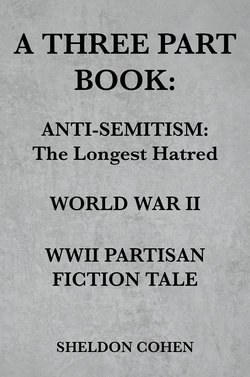Читать книгу A THREE PART BOOK: Anti-Semitism:The Longest Hatred / World War II / WWII Partisan Fiction Tale - Sheldon Cohen - Страница 7
На сайте Литреса книга снята с продажи.
CHAPTER 3 Family history of Albert and Sam
ОглавлениеAlbert and Sam’s ancestors can trace their lineage to Germany when their ancestors were forced to flee because Jews were blamed for the plague which decimated Western Europe in the fourteenth century…
This plague was caused by a bacterium within fleas that would infest rats. Bacteria were an unknown entity at that time. The bacteria received the name of Yersinea pestis many years later. Once the rats were killed off by fleas, Yersinea needed to find another host, so they chose the human species. A human who was bitten by a flea would have Yersinea pestis deposited under the skin, which would then spread to regional lymph nodes causing them to swell massively forming a “bubo,” hence the name bubonic plague. Eighty percent of humans infected would die, and millions did within a matter of days. Most Jews who survived either the plague, or the enmity of the populace who blamed the Jews for the Plague, fled to Eastern Europe. There they settled in Poland in an area which the Russian Government would later designate the “Pale of Settlement,” a large geographic area consisting of western Russia, Poland, Lithuania, Belorussia, and Ukraine. Jews were allowed nowhere else unless they became Christians.
While living in the Pale of Settlement, the ancestors of Albert and Sam were known as Tepperovitch and Rosenovitch. If there was a different name before that, it was lost to antiquity…
The increase in the Jewish population of “The Pale” eventually resulted in anti-Jewish pogroms (riots or killings), which started in the nineteenth century. Theories as to the causes of the pogroms ranged from blaming “Jews” for assassinating the Czar to the fact that some Jews, because they were forbidden many occupations, were forced to become “moneylenders,” incurring the ire of their debtors and business competitors.
The new Czar, Alexander III, established the May Laws in 1882, which restricted Jews in many aspects of life: Jews could only live in small towns (shtetles) and not large cities. They could not carry out any business on Sundays or Christian holidays. They were restricted to ten percent of college enrollment.
The Czar’s overseer of the Russian Orthodox Church, Konstantin Petrovich Pobyedonostsyev hoped that “One third of the Jews would die, one third would convert and one third would leave the country.” So with the Pobyedonostsyev threat looming in Jew’s minds...
One third did leave and amongst them were the future parents of Albert Tepper and Sam Rosen who moved to Germany to escape the anti-Jewish sentiment of Eastern Europe…
